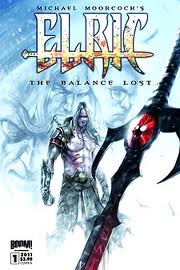Comics /
Comic Reviews /
More Comics
Elric: The Balance Lost #1
By Dan Horn
July 6, 2011 - 17:04
I wonder if Neil Gaiman bothered reading this book before his foreword to
Elric in the Dream Realms was reprinted here as an afterword. The use of an already-printed foreword to lure in new readers seems a fairly shrewd marketing tactic considering the difference in quality between the two works. You see, much like Neil Gaiman, as professed in this "afterword," my formative years were heavily influenced by Michael Moorcock's
Elric books. I'd started with
Elric of Melnibone and burned through the remainder of those original books when I was very young, my favorite still being
The Sailor on the Seas of Fate. The beautiful thing about Moorcock's sword and sorcery literature was that, while it never waxed very poetic by Inkling standards, it always had the right balance, which his books were mostly about, of adventure and of weirdness.
...Seas of Fate was the real turning point for me in my youth, representing a kind of fantasy tale that didn't necessarily have to be all about blood and bluster.
The Elric Saga was about a dainty, sulking albino cast from opulence during the rise of Chaos and forced to battle extra-dimensional monsters with a soul-sucking, bloodthirsty sword, Stormbringer, a shoe-gazing anecdote of rite of passage, drug addiction, and the transcendent properties of psychotropics. When the saga had first been released in the 60's and 70's, Elric instantly became the Frodo Baggins of American counter-culture. The band Hawkwind (Lemmy Kilmister's gig before Motorhead) practically existed solely to put Moorcock's psychedelic multiverse to music. Blue Oyster Cult and Deep Purple also played bards to Elric's adventures, though Deep Purple denied knowing about Stormbringer when writing a song that sounds as if it's talking about and as if it is named for that signature black blade.
I say all that only to tell you how disappointing this issue really was. After a long history in the comic book medium as well, Elric is no stranger to sequential storytelling, yet this may be one of his worst showings. In
Balance Lost, a modern day video game developer, whose name incidentally is Eric (yawn), begins dreaming of Elric's quest, creating a sort of metaphysical identity crisis that has been seen way too often before. Sure, Eric must be the present day incarnation of the Eternal Champion or something like that, but it's just so silly and hackneyed. Meanwhile, Elric is displaying some uncharacteristic machismo and battling a horde of zombies. Cliche after cliche, Chris Roberson takes Elric down an inexorably uninteresting path. No strangeness, no adventure:
Elric: The Balance Lost seems an apt enough description of this book in and of itself. Pinned on heavy-handed, even if it is agreeable, political allegory, characters that can't be related to, and a failed attempt at modernization,
The Balance Lost offers little to fans of the characters seen here or to new readers. This is a disservice to the rich history of Moorcock's literature.
Francesco Biagini's artwork is really superb, which is a shame for it to be wasted on this story.
Rating: 4 /10
Last Updated: January 17, 2025 - 08:20
